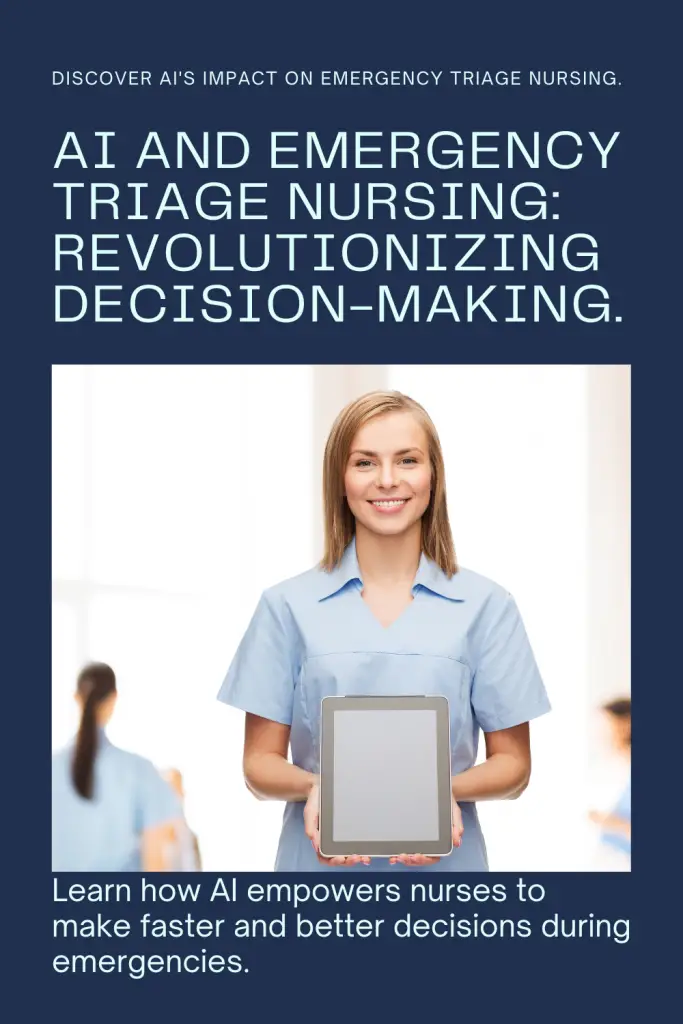Introduction
Nursing in an emergency room (ER) is a demanding job. You’re always juggling multiple tasks, and quick decision-making is vital. What if there was a way to make your job a bit easier? Enter Artificial Intelligence, or AI for short. In this article, we will discuss the benefits of using AI in emergency triage nursing.
What is Triage?The Benefits of Artificial Intelligence in Emergency Triage Nursing
Before diving into AI, let’s quickly go over what triage is. Triage is the process of sorting patients based on the urgency of their condition. The aim is to treat the most serious cases first. In an ER, nurses usually handle triage.
What is Artificial Intelligence?
Artificial Intelligence, also known as AI, is a branch of computer science that tries to make machines think and learn like humans. In simpler terms, AI helps computers do tasks that would usually require human intelligence.
Identifying Critical Cases Quickly
Instant Data Analysis
When patients come into the emergency room, there’s usually a lot of data to consider. Nurses look at vital signs like heart rate and blood pressure, and often have to go through medical histories and lab reports. Manually going through all this data takes time. AI can analyze all this information within seconds.
Prioritizing Cases
By quickly analyzing vital signs and other crucial information, AI can help nurses identify which patients are in critical condition and need immediate attention. This immediate sorting saves valuable time, allowing nurses to focus on life-threatening cases right away.
Real-time Alerts
AI can send real-time alerts to nurses and doctors. For instance, if a patient’s vital signs start to deteriorate, AI will flag this immediately, allowing for quick intervention.

No Second Guessing
Data-Driven Recommendations
When you’re working in a high-pressure environment like an ER, doubt can creep in. You might wonder if you’ve made the right call. AI helps by providing data-driven recommendations. It uses facts, not feelings, to advise on the best course of action for each patient.
Confidence in Decision-Making
Because AI recommendations are based on hard data and real-time analysis, nurses can feel more confident about their decisions. This boost in confidence not only benefits the nursing staff but also has a positive impact on patient outcomes.
Reduced Mental Fatigue
Making repeated quick decisions in high-stress situations can lead to mental fatigue. AI can help by taking over the initial data analysis and sorting of patients, allowing nurses to focus more on care delivery rather than data crunching. This can make the work environment less stressful and more efficient.
Consistency in Assessment
Fair Treatment
Because AI follows set rules and uses data, there’s a consistent standard for triaging patients. This means every patient gets assessed fairly, based on their condition, not other factors.
Reduced Human Error
Let’s face it; humans can make mistakes, especially in a high-pressure environment like an ER. AI can serve as an extra safety net, catching things that might be missed.
Better Resource Management
Staff Allocation
AI can help figure out how many nurses are needed at different times. For example, if the ER is usually busy on Friday nights, AI can recommend having extra staff on hand.
Supply Usage
AI can track which supplies are being used most often and can even suggest when to reorder. This helps the ER stay well-stocked, so you have what you need when you need it.
Final Thoughts
AI is not meant to replace nurses, but to assist them. The goal is to make the triage process faster, more accurate, and efficient. Embracing AI in emergency triage nursing can lead to better patient care, and make your challenging job a little easier.
By understanding and adopting AI in emergency settings, nurses can focus more on what they do best—caring for patients.
Sources
https://www.ncbi.nlm.nih.gov/pmc/articles/PMC10245226/
Related Articles
Artificial intelligence in nursing informatics
Role of artificial intelligence in nursing practice
Examples of artificial intelligence in nursing

